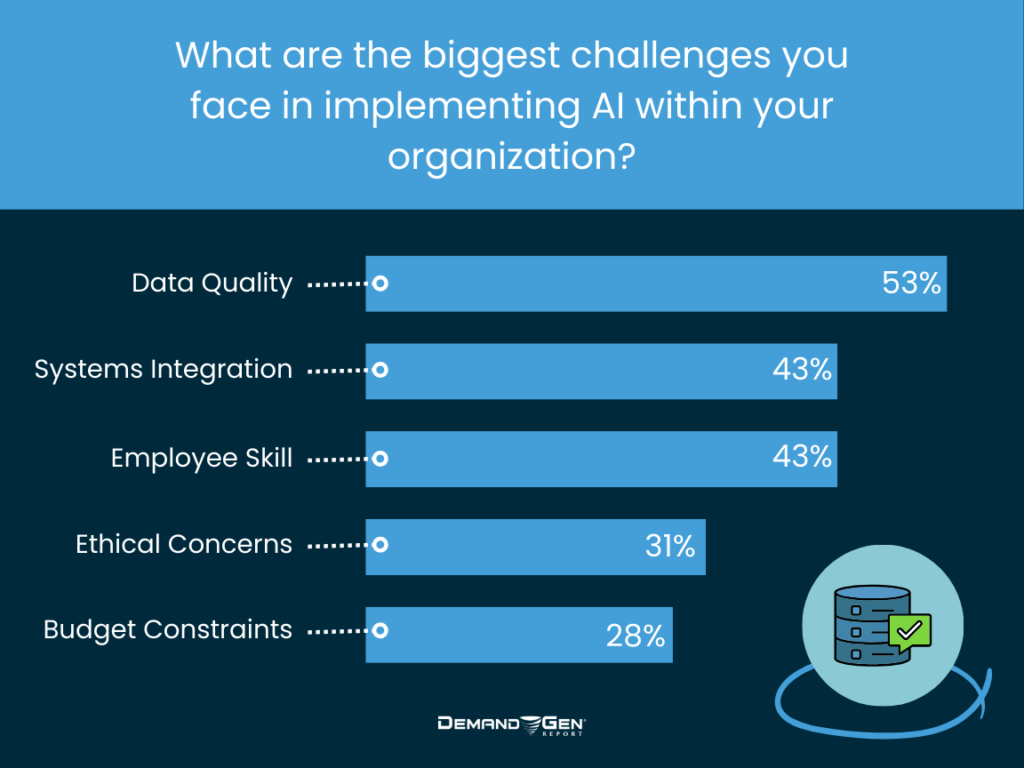Artificial intelligence (AI) has become a fixture within many B2B marketing organizations, with generative AI (GenAI) gaining a significant amount of mind and wallet share, especially among marketers. According to a survey of 418 marketing teams conducted by Gartner, 73% use GenAI in some capacity.
Companies ranging from JLL to Klarna have praised AI for its impact on operational efficiency and performance. Demand Gen Report wanted to understand if and how our community was using AI to support marketing operations. More than 100 respondents shared insights into how they believe AI will shape the future of their organizations — and the broader B2B landscape.

AI Adoption is the Mainstream, but Varies
The vast majority of survey respondents use some kind of AI to support their marketing efforts. Like the broader industry, our audience favors GenAI. It’s easy to understand why, given the mainstream education and adoption of tools like Chat GPT and Perplexity. A growing number of MarTech players, from Adobe to Canva, are launching their own generative AI tools.
However, the second most popular AI category is conversational AI, which refers to technologies, from chatbots to virtual agents, that website visitors and prospects can converse with to get information. Conversational AI combines natural language processing and machine learning to not only imitate an organic, “human” conversation but combs through and leverages vast intelligence (including company resources) to ensure buyers’ questions are answered quickly and accurately, whether through a chat inquiry or high-value content.
Both GenAI and conversational AI can drive high-impact results. And given how quickly these markets are evolving, there are myriad solutions available that enable marketing teams to get up and running relatively quickly. However, we’re still in the early stages of AI, which means marketing teams are slowly but surely testing other tools powered by predictive analytics to optimize their content and campaign investments.

Marketers Use AI to Accelerate Content Creation
The most obvious and most widely adopted AI use case is content creation. B2B marketing teams are strapped for time and resources. They’re facing increased pressure from leadership and their sales counterparts to create more content for new audiences, new sectors and new channels. AI empowers marketers to create, curate and even customize content at scale and alleviate that stress.
AI, especially GenAI platforms, are also powerful platforms to support the pre-content creation stage. Several respondents noted in the comments section that they use AI for ideation, brainstorming and as a “starting point” for content concepting. This feedback aligns with the 53% of respondents who use AI to support market research.
However, what’s surprising about these results is that significantly fewer marketers are using AI to support some of the key tactical channels that ensure the content is successful. For instance, only 21% of respondents use AI for social media management. And while less than a third of respondents (32%) indicate that they use AI to support personalization, this is a clear area of opportunity, especially as B2B organization use intent data to enrich and better tailor their content and advertising campaigns.

B2B Marketers are Wise to AI’s ‘Garbage In, Garbage Out’ Threat
B2B marketers are expanding their use of AI in daily workflows, but they are mindful of the internal risks and gaps that still exist. Especially top of mind is data quality, with 53% of respondents saying it was their biggest challenge in implementing AI within their organizations. Accurate and timely data are the foundation of all successful AI-generated content and creative. That means B2B organizations must have a consistent data integration and cleansing strategy. Moreover, they must ensure their systems are integrated to ensure all tech has the latest data. However, this was a noted challenge for 43% of respondents.
Although there have been several studies and industry think pieces focused on the ethical risks of AI, only 31% of respondents cited this as a challenge. Respondents wrote in several viable respondents that were not listed, including data security and lack of nuance. As one respondent noted, there was a clear gap in results for inquiries that required “qualitative evaluation,” often leading to “generic content” that “lacked nuance.”
During the upcoming Campaign Optimization Series, B2B marketing leaders will discuss how AI is ushering in a new era of content marketing, account-based marketing (ABM) and advertising. Click here to register.







